Whether you are successful in your language-learning pursuits is heavily influenced by whether you’re able to stick with it or not. And sticking with it is much easier if you get into the habit of practicing your Chinese.
After all, isn’t it better if language learning is more like brushing your teeth and less like pulling teeth?
Toward this end, we have built tools into WordSwing for building and maintaining your learning habits.
Habit formation and maintenance
You can see how you’re doing with your habits, as well as create new ones and mark habits complete in the Habits area available from the main menu.
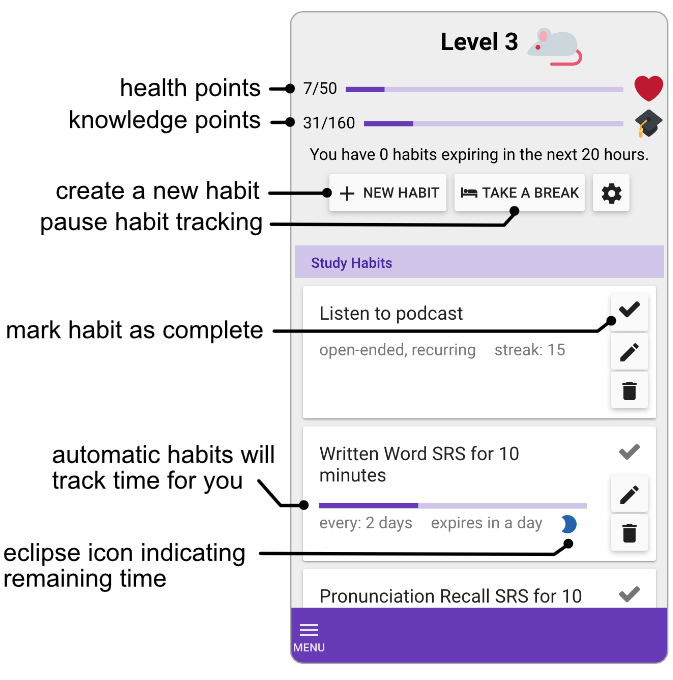
Successfully building a habit involves several steps:
- Identifying the desire to change one’s behavior.
- Starting the new habit by performing the behavior and repeating the behavior.
- Internalizing the habit and making it routine.
The first item is largely up to you, though by being here it’s clear you want to learn. That leaves starting a new habit and making it habitual.
Starting a new habit
An important part of getting a habit going is deciding what will make a good habit and doing it the first time.
What makes a good habit?
You can define your habits to be anything that is meaningful to you. What you choose likely depends on how much time you want to dedicate to studying Chinese, how you like to study, and where you are along your language-learning journey.
But in general, it’s helpful to keep the following ideas in mind:
- Pick bite-sizes habits. Something that can be accomplished in a single sitting in somewhere between 5 and 20 minutes is probably best. This will encourage you to stay focused on the particular study goal.
- Be specific. You want to have a clear sense of what it will mean for the habit to be accomplished. For example, “Listen to one dialog”, or “Use SRS for 10 minutes” are fairly precise. On the other hand, “Learn some new words” is much less precise. It’s hard to be motivated to accomplish something when you don’t even really know what it is.
- Pick something you’ll want to do. While there is some merit to forcing yourself to do unpleasant things, you’ll be much better off if you can find ways to practice Chinese that you enjoy. So if SRS isn’t your thing but like watching Chinese dramas on Youku, then maybe make your habit something like, “Watch 15 minutes of a Chinese drama.”
Recurring, expiring, and open-ended
There are three habit sub-types that relate to whether the habit expires and whether it automatically renews:
- Recurring habits - These habits renew after some number of days. And if you don’t complete the habit before it renews you’ll take a hit to your health. These habits are ideal for your usual study routine.
- One-time, expiring habits - These habits have a chosen duration (one or a few days), but do not automatically renew. These are ideal for when you have a goal in mind but don’t want to commit to doing it on a regular basis.
- Open-ended habits - These habits do not expire. These habits are for activities you do on an irregular schedule.
Personal and Automatic habits
A habit can either be a personal habit, which describes anything you would like to do or an automatic habit, which is tied to a particular WordSwing activity.
Personal study habits can be defined to be any study or language-learning effort. These are entirely self-directed; you decide what it means to you and you mark it complete when you’ve met your goal.
When you tap on the “New Habit” button (see diagram above), and you choose “Personal” (shown below) you can describe the habit however you like and configure the other details:
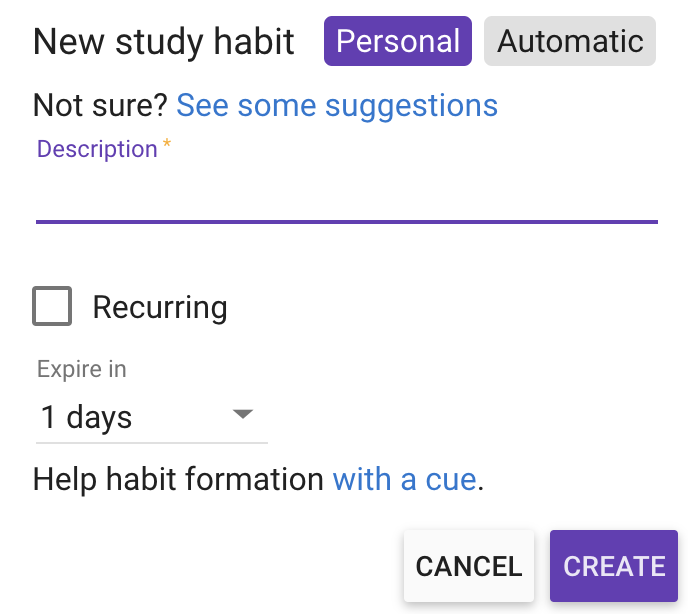
In addition to providing a description you also configure whether you would like the habit to automatically renew (recurring).
Automatic study habits are tied to a particular WordSwing activity and are based on how much time you use that activity. WordSwing automatically tracks your time and marks the habit complete when you’ve met your goal.
You can pick which activity you want the habit to track and how much study time will satisfy it:
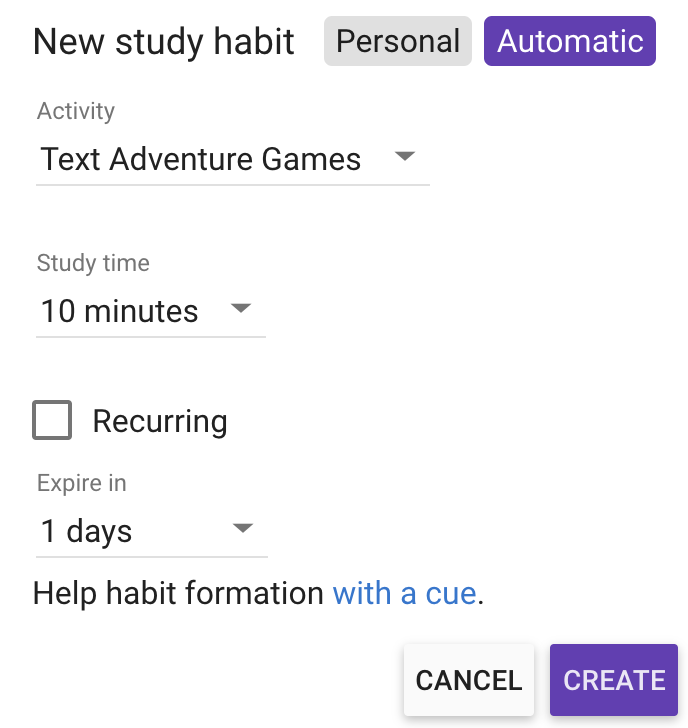
Making habits habitual
We have designed our habit tracking features with a mind toward innate human behaviors and psychology.
Contextual cues
One reliable way to make habits more automatic is to pair your study behavior with other activities you already do. Connecting a habit to an existing routine allows you to rely on an environmental or contextual cue to stimulate the desired study behavior, something the scientific literature has identified as an important aspect of habit formation.
For example, it’s easy to develop a habit of putting your safety belt on when you get into the car because the action of putting the belt on is easily associated with the act of getting into the car. Every time you get in the car you put your belt on, and conversely, you don’t need to think about putting your belt on except when you climb into the car.
Here are some examples of how you might pair practicing Chinese with other behaviors you already have habits for:
- Review vocabulary while on the bus. If you get in the habit of getting out your phone and reviewing some Chinese vocabulary each time you find yourself sitting idly on the bus, not only will you be making good use of downtime, but the context of sitting on the bus will spur you on to whip out your phone and knock out some words.
- Listen to a podcast while jogging. Rather than listen to music while jogging, why not listen to a Chinese podcast? (e.g., ChinesePod). Your desire to be in shape and desire to learn Chinese can mutually complement each other in reinforcing both of these habits.
- Review some vocabulary before bed. Going to bed is not something you’re likely to forget to do, and if you establish a habit of reviewing some vocabulary before going to bed, pretty soon Chinese words will start popping into your head as soon as you start yawning in the evening.
When you create a new habit, you have a choice to associate a contextual cue:
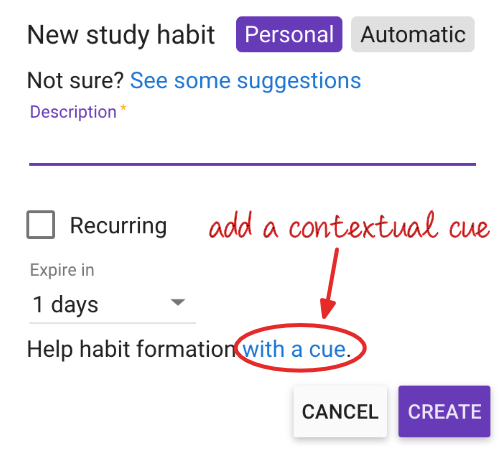
You can write anything you like as the cue. Something that works well with the activity (driving and reviewing vocab is probably a bad idea) and that you already have a habit of doing is often a good choice:
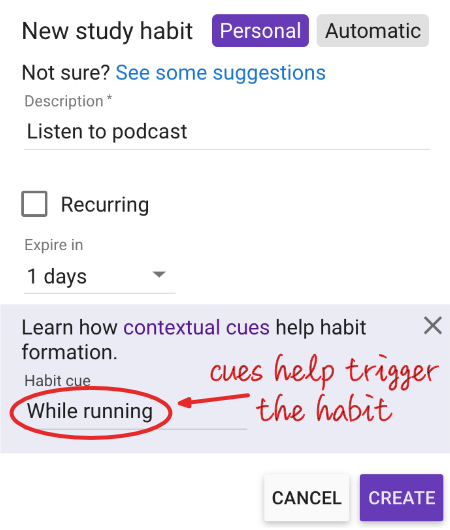
Naturally, you don’t need to only do that study behavior in the context of your environmental cue. But thinking about and setting a cue, and seeing it when you check off the habit, is a great way to help the study habit become an automatic part of your routine.
Reinforcement and loss aversion
Part of our habit building toolkit is the gamified tracking of health and knowledge points. While this may seem like a gimmick, we hope it will be effective, as is taps into two symbiotic human behaviors, reinforcement and loss aversion.
Completing habits yields a reward, knowledge points, while letting them expire incurs a hit to your health. When you reach your knowledge goal you advance to the next level, but if you lose all your health you go back a level (starting anew with full health). These positive and negative rewards help reinforce successful execution of the habit.
And although these rewards are entirely synthetic, please don’t forget that there is also the entirely intrinsic reward of working successfully in the Chinese language to complete your study tasks and the accompanying sense of accomplishment.

But there’s another force at play here too.
Once you’ve worked hard to meet your goals and level up, it will become heartbreaking to move backwards (okay, maybe not quite heartbreaking, but you’ll be disappointed).
This is the natural human tendency to be loss adverse. By having achieved the your current level, you value it even more than potential future rewards you might get from completing future habits. But by not completing your recurring or expiring habits you will lose health and eventually a level.
Thus if you are willing to buy into this imaginary reward system of knowledge and health points, then you can turn these quirks of human psychology into powerful tools tools to develop reliable study habits and advance your Chinese.
As always, we hope you enjoy and that these tools help with your study of Chinese. And don’t forget to let us know what you think @wordswing or by email at team@wordswing.com.
Finally, we owe a huge debt of gratitude to the amazing folks over at Habitica who have pioneered this form of habit tracking, and proved that it exerts a powerful tug on our psychology. If you’re looking for all-purpose habit tracking and a more gamified experience, we encourage you to check out Habitica.